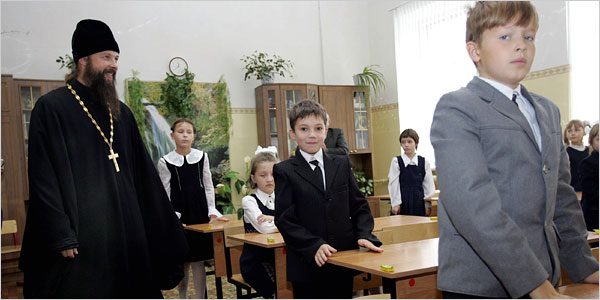Hevitra ato Anatiny
In our country, the training program changes almost every year. Something new appears, something goes, in the opinion of officials of the education system, unnecessary. And so another initiative arose – to teach Church Slavonic in schools.
This, to put it mildly, non-standard proposal was made by the President of the Russian Academy of Education Larisa Verbitskaya, a professor and a famous fighter for a beautiful and correct Russian language. An interesting, in her opinion, initiative was born at the presentation of the first volume of the “Great Dictionary of Church Slavonic Language”. Now this language is used only in divine services. But a lot of words from it passed into ordinary spoken Russian, which is logical.
However, despite all the value of Church Slavonic in the cultural and historical context, the question arises: is it needed in the school curriculum? After all, for his sake you will have to sacrifice something else. More useful. Children are already overwhelmed, where they need another additional subject. And that mathematics, literature or English are much more likely to be useful to schoolchildren in the future – do not go to a fortune-teller.
– How long nonsense you can invent! – Natalya, mother of 14-year-old Sasha, is indignant. – That absolutely idiotic OBZH was introduced, where children learn military ranks and write essays on how to survive during a nuclear attack. Well, tell me, why does Sasha need to know how many stars are on the major’s shoulders and how does a midshipman differ from a sergeant? It would be better if they taught Japanese. Or Finnish.
Natasha snorts angrily into the cup – and it’s hard to disagree with her. However, even if the initiative to introduce a new (or very old?) Discipline finds approval at the state level, it will not be a quick matter. In the meantime, we decided to look abroad and find the most curious school subjects. What if something in our education would be useful?
Japana
There is a great lesson here called “Admiring Nature”. It only seems at first glance that the case is useless. And if you think about it, then there are a lot of pluses: children learn to observe, notice details, they develop attentiveness and concentration. Not to mention the feeling of beauty. In addition, such an activity has a very pacifying effect on schoolchildren (and not only). And love for the native land is waking up. Which is also not superfluous.
Germany
The Germans are such entertainers. One of the schools in Germany has a subject called “Lessons in Happiness.” This would definitely not hurt us. After all, many of us are unhappy simply because they do not know how to do it differently. There is always something that makes it easy to get upset or upset. And to rejoice? So they teach little Germans to be in harmony with themselves, to comprehend their inner world and enjoy life. They even give grades – to get a good one, you need to do charity work, for example. Or create some kind of your own project.
USA
“Scientific discoveries” – no more and no less! This is not a lesson, but rather an academic year of work. The student must come up with his own know-how and justify its relevance, usefulness and relevance. And all the rest will unanimously pass a verdict whether the author of the invention overestimated his brainchild. By the way, we are also introducing something similar in some schools. But children do not invent, but rather prepare term papers on a particular subject.
Aostralia
Oh, this is just amazing. A very nice item. Surfing. Yes Yes. Children are taught the art of riding waves as part of the school curriculum. Well, why not? There are waves, boards too. Surfing in Australia is practically a national idea. No wonder this country has a reputation as a place where the best surfers in the world live.
Novely zelandy
This island country does not lag behind its neighbor. They don’t teach surfing here, but they dilute the standard school curriculum with different usefulness: they teach the basics of computer graphics and design, accounting and electronics. So, you see, the child will reveal his talent. And there will be one more happy adults in the country.
Bashkortostan
Here children are seriously studying beekeeping. After all, Bashkir honey is a very cool brand. From early childhood, children are taught to take care of bees so that honey production is always at its best.
Isiraely
In this beautiful warm country, they approached the preparation of the school curriculum in a purely pragmatic way. Since we have come to the computer era, then the emphasis is on it. Children study the subject “Cybersecurity” in the classroom, in which they are taught, among other things, behavior in the network. And they even talk about addiction to games and social networks. Agree, it is much wiser than prohibiting the Internet.
Armenia
Folk dances. Yes, you heard right, and this is not a typo. Armenia is very concerned about the issue of preserving culture and is solving it in such a non-trivial way. Agree, this is not bad. Children learn to dance, and physical activity is never superfluous. Well, the main function – knowledge of one’s own culture – is fulfilled. Bingo!










